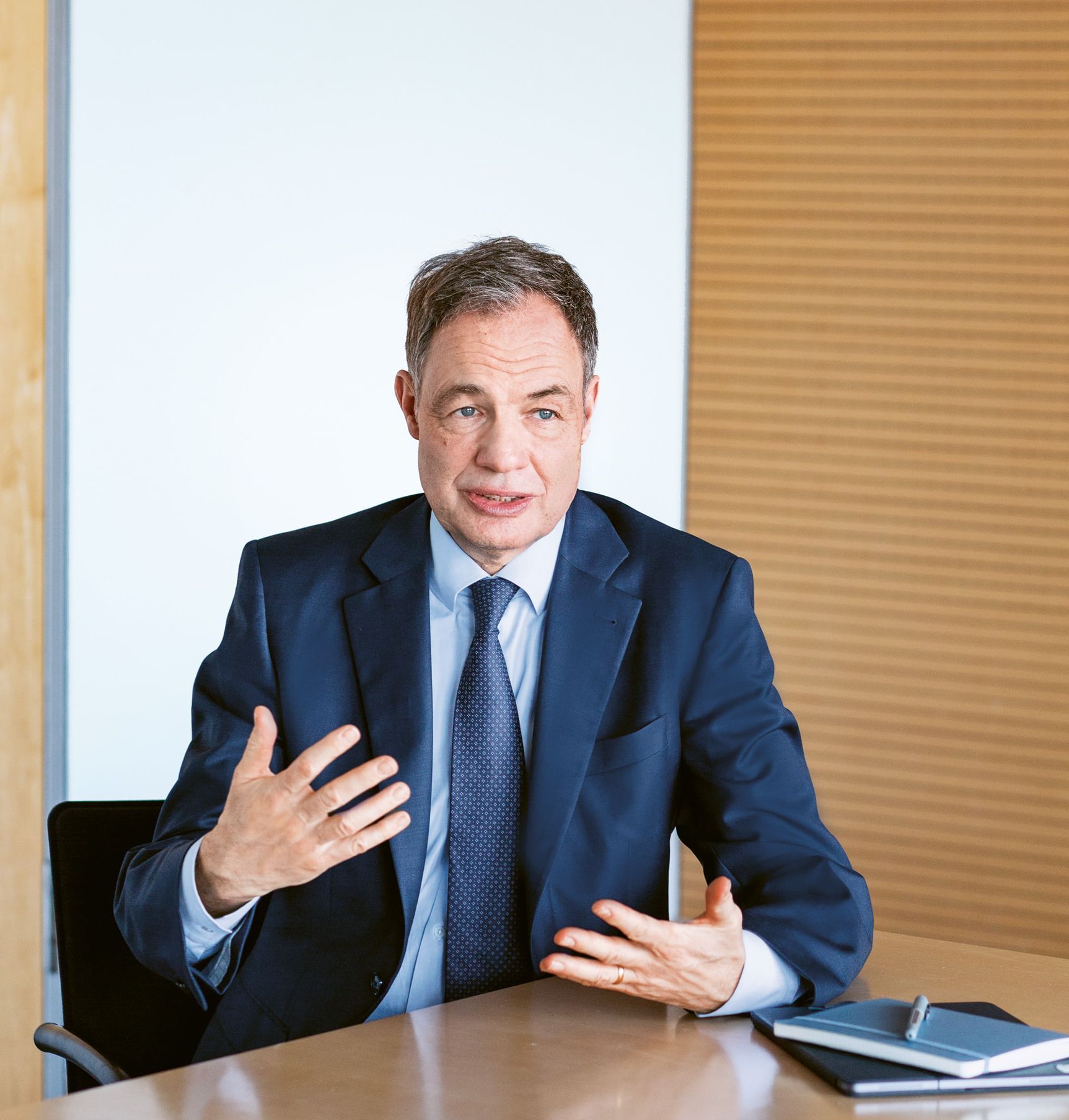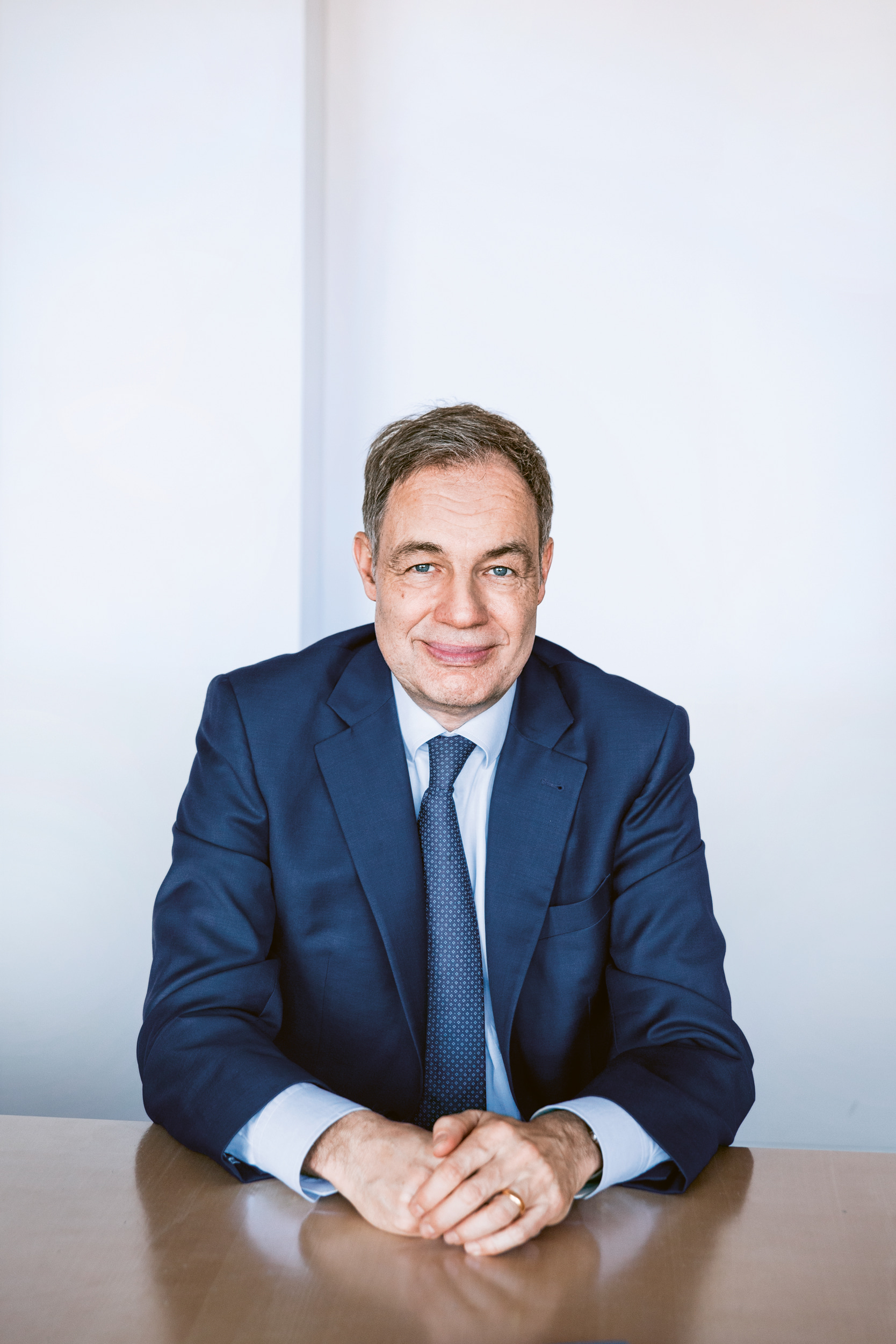CAPITAL INVESTMENT AS A LEVER FOR ESG
Interview with Gregor Farnschläder, Versicherungskammer Group
Investors are no longer interested in companies’ financial success alone. They also want to know how they’re performing when it comes to ESG (environment, social and governance). Gregor Farnschläder is head of the Investment Strategy and Investments department at the Versicherungskammer Group, one of Germany’s largest direct insurers. In this interview he will give us an insight into the importance of sustainable investment for his organization.
Mr: Farnschläder – How important is ESG at Versicherungskammer? How key are ESG criteria when it comes to making investment decisions?
For us, as insurers, sustainability has become a central part of our corporate strategy. As a company with a public mandate, the Versicherungskammer Group carries a particular responsibility in society. We also have a duty to our customers to ensure that we can fulfill our financial obligations in the long term. This means it is especially important that we recognize the opportunities and risks arising from the current transformation processes early on. A change in carbon pricing or demographic developments can have a severe impact on the profitability of the companies that we invest in – depending on how well these companies are prepared for these changes.
So, ESG criteria really influence your decisions.
That’s right. We’re aware that our capital investment can act as a lever in driving ESG processes forward. With targeted investment – in renewable energy, for instance – we are making an active contribution to the current energy transition. We have set exclusion criteria and minimum standards that match the corporate image of the savings banks financial group, which we belong to. These in turn are based on international frameworks. For example, we will not invest in companies that are involved with manufacturing controversial weapons. In our opinion, sustainable business also means complying with social standards such as human rights, labor standards and regulatory compliance. We accordingly avoid investing in companies that violate the UN Global Compact.
ESG is also a data issue. The market hasn't solved this yet.«
What investment options are open to you as an institutional investor that are not open to private investors?
Generally, we approach the capital market in the standard way – the same as any other investor. We make direct and indirect investments. Our direct investments mainly relate to real estate and fixed-interest securities. This includes bonds from companies operating in fields that are relevant to us – for example, in the infrastructure sector. When it comes to indirect investments, we often purchase shares in companies. In these cases we invest via special funds, which are generally fully held by us. We award management mandates and provide the asset managers with guidelines on their investments and stipulate the type of companies they should invest in. Our share of direct investments has increased recently. Due to the better cost structures we also intend to keep expanding in this area in the future.
What exactly does the process of finding a suitable candidate for direct investment look like?
We generally observe the overarching trends when looking for a target company. We then work with our experts to analyze the environment in which the company we’re interested in is active. This includes looking at the material ESG aspects that may impact the company’s profitability now and in the future. Standards and frameworks such as the Sustainable Development Goals (SDGs) are helpful in this regard. In addition to profitability and sustainability, however, we also keep an eye on our other criteria such as portfolio diversification and liquidity. For example, when making an investment we must also make sure that we can meet our payment obligations at all times.

How much influence do you have as an investor in driving a company’s sustainability performance forward?
First of all, we have to remember that change always comes from the company itself. In the future, however, the role we play in direct investments as an active owner will certainly prove an effective tool. We will speak directly to the companies about issues that are important to us.
This will be more difficult when it comes to indirect investments in the form of shares. But here, too, we can have a direct impact by ensuring that the capital asset management companies we commission abide by our principles when exercising our voting rights. In the end, how much influence we have will depend on the amount we invest.
Growth industries require new expertise and possibly even new structures. To what extent do these first have to be established?
The asset classes that are particularly relevant to us in terms of expertise and structure are those that we invest in directly. Infrastructure, for example, with issues like renewable energy, is extremely complex. We have the necessary expertise for this within the Group. Whenever we need new expertise, we draw on external sources. We are coming from a time in which we invested in very similarly structured products, such as government bonds. Nowadays, the trend is increasingly moving towards tailor-made solutions, and this requires a completely different set of knowledge. That means our business has become significantly more complex in recent years.
At the moment, players on the market still have to get to grips with a number of ESG standards. Which standards are particularly relevant to you?
We are focusing on the ones that are common on the market. This includes the Principles of Responsible Investment, which we signed in 2019. We are also observing how the market is developing. In particular, we are concentrating on EU regulations that have been implemented since March last year.
We are currently seeing a number of standards converging – for instance, through the consolidation of the Climate Disclosure Standards Board and the Value Reporting Foundation under the new International Sustainability Standards Board (ISSB). I think this is a sensible move as we currently have a number of standards that all relate to the same area.
To fulfill these standards you need data.
That’s correct. The issue of data has not been solved by the market. Who collects the data? How can it be managed? There are currently some exciting developments in this field, but what we already know is that this is a very complex topic and it will involve costs.
How important are external ratings for you?
Dealing with ratings is part of our everyday business. But unlike credit ratings, ESG ratings can result in very different grades. This has to do with the fact that ESG ratings can have conflicting targets. The sustainability rating for an electric car can be good or less good depending on your point of view. Regardless of this, we are currently selecting a data and ratings provider that will provide us with the information we need. We will choose the provider whose logic is the easiest for us to follow. In the end, though, ESG ratings will only constitute a part of our decision on whether to invest or not.
How has your investment strategy changed in recent years? Which investments do you now turn down and what have you become more interested in?
Basically, I would say that the awareness for ecological challenges has grown – amongst our customers, our employees and our owners, the savings banks. At the same time, digitalization means we now have access to a lot more information when we make our decisions. We have made the most of this and become more confident in what we believe constitutes sustainable capital investment. Investing in companies that are involved with controversial weapons, for instance, is absolutely out of the question for us. The same applies to companies that breach the UN Global Compact. We have also defined maximum thresholds for revenue that companies can earn from coal-fired power generation or coal mining and production before we consider them.
And where has your interest increased?
We have a great interest in companies that contribute to the transition to a sustainable, carbon-neutral economy. Our investments in wind and solar farms, for example, along with the gas network, have increased. Gas is a transitional technology, but we will be able to retrofit the network for hydrogen in the medium term. This is a resource that may be a key factor in solving our energy issues.
Achieving ESG and economic success is a balancing act. How would you describe the interplay between these two factors in your organization?
As a trust, being and remaining economically successful is incredibly important for Versicherungskammer. That is why it is important for us to pursue a credible approach that unites both factors. It is universally accepted that ESG aspects can have a positive impact on a company’s economic success. In the short term, however, they can mean considerable expense for a company. In this case I would say that if an investor would like to see their values reflected in a company, they must also be willing, figuratively, to pay for them.
In our experience we have seen that there is rarely an “absolute truth.” There are plenty of companies that match our long-term and balanced investment strategy well. But we also know that those looking to invest according to their values will find the number of capital investments that come into question much smaller.
People who invest sustainably must be willing to bear the costs.«
Politicians are currently setting clear standards for the economy in terms of carbon requirements. And they are keeping us on our toes in other areas, too. How do you feel about these developments?
The regulations are a challenge. We agree with the 1.5°C target and the EU Green Deal. These initiatives have our full support. I would describe the current pace, however, as overly ambitious. This becomes clear when we look at the constant amendments to reporting requirements, for example, because the necessary prerequisites are not in place. We are expected to report, manage data and establish structures for requirements that are currently unknown. That is impossible. The regulations often expect too much immediately and are not sufficiently coordinated. This will probably be corrected in the next five years.
Many business people share this view. Mr. Farnschläder, how does the increase in sustainability awareness impact your personal everyday life?
I feel very lucky and enjoy the fact that I can ride my bike to both Versicherungskammer offices in Munich. The short distance means I don’t even have to consider whether I might need an electric bike or car.

Gregor Farnschläder
is senior head of the finances and capital investment executive department at the Versicherungskammer Group. He is responsible for strategic asset allocation and strategic holdings. After completing a business degree, he started his career with Deutsche Bank in Frankfurt, then moving to the insurer AXA in Cologne. He joined Versicherungskammer’s central managerial accounting department two decades ago.